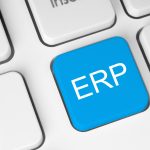4 Core Ways ERP Can Help Small Businesses With Growth
There was a time when enterprise resource planning software was only for the large companies. That time is past! Small and medium businesses are quickly finding the benefits of ERP to be exciting, and adopting it large scale, particularly with the advent of SaaS and the cloud. The reason? Small companies often have people that do more than one thing. People help where they can when an extra pair of hands is needed, and efficiency is the biggest goal. ERP is nothing if not an enabler of efficient operations. It helps automate tasks and brings the ability to keep consistent with information.
In choosing an ERP system, unfortunately, there isn’t a one-size-fits-all version for all small businesses. Businesses have different goals, different competitive advantages, and different ways of operating. These things will come into play in your selection. In general, however, any small business adopting ERP can expect the software to support your growth. Here are four ways in which you will realize that support.
1. Greater productivity
As we said above, ERP is the final word in making you more efficient and therefore more productive. Productivity spells an increase in bottom line. No small deal for SMEs. All your data is readily available in one place, in real-time. That means people no longer having to follow up with one another and waste time. If you start your ERP exercise with the setting of strategy and mapping your businesses processes, your productivity will see an even greater increase. But as a small business, remember that you need to stay agile, something that needs to extend to your enterprise system. Software that’s available in modules, where you can tack on or deactivate as your business evolves would be ideal. This offers you the benefit of being able to stay lean on your costs while realizing the greatest benefits.
2. Complete integration and collaboration
As a small business, manually keeping everyone in the loop every time you update something is unrealistic. When everyone in the enterprise has access to the same, updated set of information, things become easier. You put in place a common agenda and everyone is on the same page. You can forget manually re-entering information and arguments over whose data is the most recent. For a small company, this means staying focussed, and ultimately, growing.
3. Improved decision-making
This benefit feeds back into the importance of up-to-the-minute data. Data facilitates insights and insights make for better decisions. Often smaller companies weigh in at length over the big decisions, second-guessing themselves because the stakes are much higher. The business world moves at a quick pace and being able to respond with agility is one of the quickest hacks to growth. A goal hugely supported by good decision-making.
4. Lower costs
Finally, in the case of SMEs, so much depends on the money! Being able to keep your costs down in a meaningful way, without cutting corners is important. ERP can help you do this. Streamlining into one system means avoiding duplication of costs on the software itself, avoiding duplication of tasks by your people and therefore, saving time which equals money!





